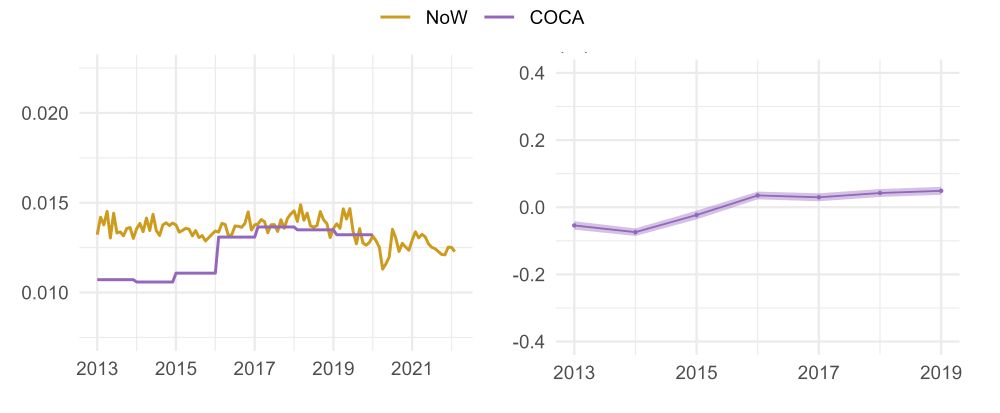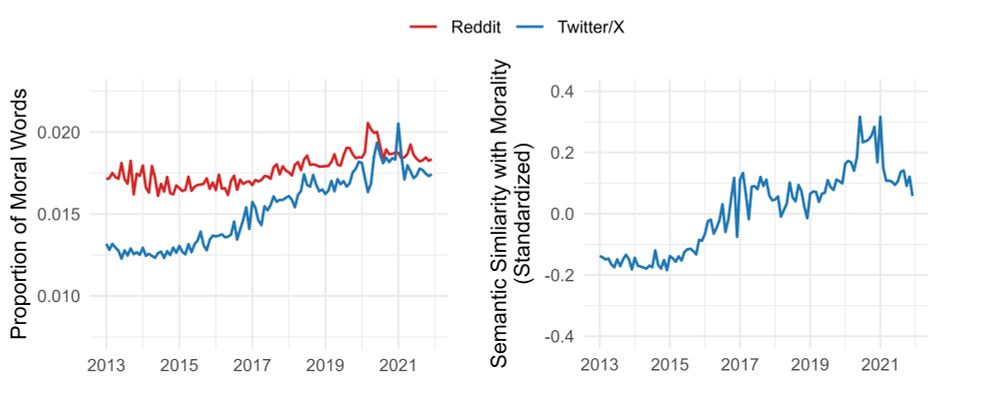
Curtis Puryear
@curtispuryear.bsky.social
Assistant Professor at UNCW studying morality, politics, and intergroup conflict.
puryearc@uncw.edu
http://curtispuryear.com
puryearc@uncw.edu
http://curtispuryear.com
Here is the link to the preprint: osf.io/preprints/ps...
Huge thanks to my collaborators: @williambrady.bsky.social @nourkteily.bsky.social , who helped shape this project from its inception. And to @joshcjackson.bsky.social and @ycleong.bsky.social , who helped expand the scope of this project.
Huge thanks to my collaborators: @williambrady.bsky.social @nourkteily.bsky.social , who helped shape this project from its inception. And to @joshcjackson.bsky.social and @ycleong.bsky.social , who helped expand the scope of this project.
OSF
osf.io
July 22, 2025 at 3:37 PM
Here is the link to the preprint: osf.io/preprints/ps...
Huge thanks to my collaborators: @williambrady.bsky.social @nourkteily.bsky.social , who helped shape this project from its inception. And to @joshcjackson.bsky.social and @ycleong.bsky.social , who helped expand the scope of this project.
Huge thanks to my collaborators: @williambrady.bsky.social @nourkteily.bsky.social , who helped shape this project from its inception. And to @joshcjackson.bsky.social and @ycleong.bsky.social , who helped expand the scope of this project.
Our results suggest social media can reshape public square, by pulling new topics into (and pushing some people out of) moral debate + turning up the heat on already moralized topics. Key Q: How can we design community norms and/or algorithms to curb moralization without chilling civic engagement?
July 22, 2025 at 3:37 PM
Our results suggest social media can reshape public square, by pulling new topics into (and pushing some people out of) moral debate + turning up the heat on already moralized topics. Key Q: How can we design community norms and/or algorithms to curb moralization without chilling civic engagement?
Finding 4: Moralization both spread into new topics (hobbies, entertainment) AND intensified within already moralized topics (e.g., politics). But we only observed intensification on Twitter/X, which again, suggests platform design may matter when it comes to mitigating runaway mitigation.

July 22, 2025 at 3:37 PM
Finding 4: Moralization both spread into new topics (hobbies, entertainment) AND intensified within already moralized topics (e.g., politics). But we only observed intensification on Twitter/X, which again, suggests platform design may matter when it comes to mitigating runaway mitigation.
Finding 3: Moralization rose in two ways: same users used 3 % more moral words each year BUT extreme voices also gained share. On Reddit we saw only the first (+0.3 %/yr); extremists didn’t take over. Hint that long comments, downvotes & lighter engagement ranking blunt selection effects.
July 22, 2025 at 3:37 PM
Finding 3: Moralization rose in two ways: same users used 3 % more moral words each year BUT extreme voices also gained share. On Reddit we saw only the first (+0.3 %/yr); extremists didn’t take over. Hint that long comments, downvotes & lighter engagement ranking blunt selection effects.
What user dynamics drive increases in moralization? Are the same people becoming more moral (e.g. social learning), or are the types of people engaged online changing, such that high moralizers dominate discourse (e.g., selection effects)? We find the answer is BOTH.
July 22, 2025 at 3:37 PM
What user dynamics drive increases in moralization? Are the same people becoming more moral (e.g. social learning), or are the types of people engaged online changing, such that high moralizers dominate discourse (e.g., selection effects)? We find the answer is BOTH.
Finding 2: Moralization increased relatively less in traditional media. Rate of moral words in Corpus of Contemporary American English increased, but occurred almost entirely in a single year (1.11% to 1.31% in 2016), and moral words actually decreased over time in the News on the Web corpus.

July 22, 2025 at 3:37 PM
Finding 2: Moralization increased relatively less in traditional media. Rate of moral words in Corpus of Contemporary American English increased, but occurred almost entirely in a single year (1.11% to 1.31% in 2016), and moral words actually decreased over time in the News on the Web corpus.
Finding 1: Moralization increased significantly on social media. Rate of moral words increased on Twitter/X by 41% from 2013-2021 (1.28% of words in posts to 1.80%) and word embeddings showed topics shifted .296 SD toward morality. Moral words also increased on Reddit, to a lesser degree: by 6%

July 22, 2025 at 3:37 PM
Finding 1: Moralization increased significantly on social media. Rate of moral words increased on Twitter/X by 41% from 2013-2021 (1.28% of words in posts to 1.80%) and word embeddings showed topics shifted .296 SD toward morality. Moral words also increased on Reddit, to a lesser degree: by 6%
Social media lets people share their perspectives globally and instantaneously for the first time in history. But it can also incentivize people to boil complex issues into simplistic, moralized narratives. This might create a moralizing shift in discourse, which we identify and explain here.

July 22, 2025 at 3:37 PM
Social media lets people share their perspectives globally and instantaneously for the first time in history. But it can also incentivize people to boil complex issues into simplistic, moralized narratives. This might create a moralizing shift in discourse, which we identify and explain here.

